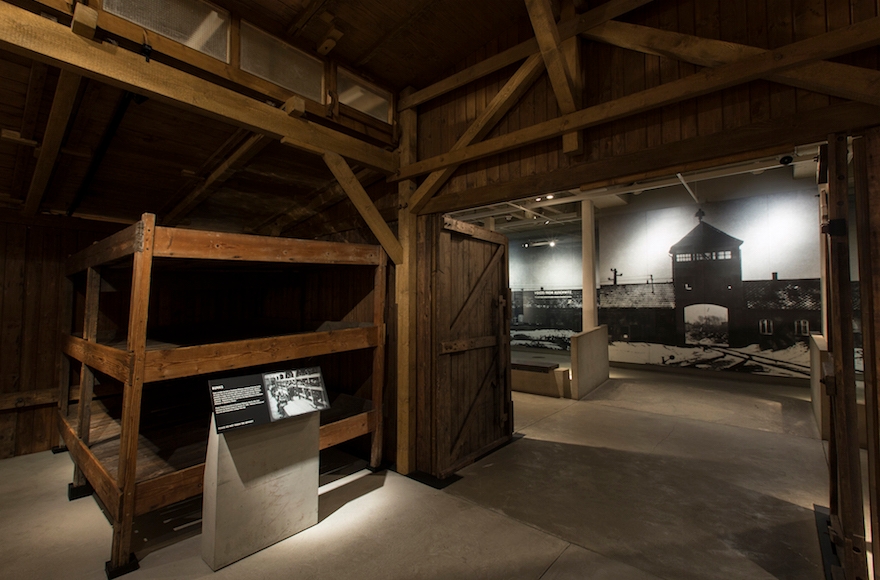WASHINGTON (JTA) — Recent alarming events in Poland, most notably a law “protecting the reputation of the Polish nation” by criminalizing certain speech regarding the Holocaust, have led me to reflect on my own relationship with that country. It’s a relationship that spans three decades, dozens of visits, various negotiations — and the cultivation of many cherished friends and colleagues.
I made my first visit in the summer of 1987 as a midlevel professional working for a project to build a Holocaust museum on the National Mall here. Upon seeing my first communist country, I was struck that everything was gray – the buildings, the interiors, the clothing. That turned out to be a somewhat superficial impression.
No one forgets the gut-wrenching experience of their first (or any) visit to Auschwitz-Birkenau. My first visit was made special by a remarkable woman, historian Teresa Swiebocka, who was my guide. In spite of the many political and cultural restraints, and all the propaganda she had been fed, she was devoted to historical truth. She was not gray. She was deeply immersed in Holocaust history, and as she walked the blood-soaked earth of Birkenau, she seemed to know what had transpired on every inch of it. She spoke with great conviction and sensitivity.
Teresa’s knowledge was not based on the communist-controlled “history” designed to advance its political agenda. Instead of conflating all victims of Nazi crimes as “the victims of fascism,” she understood the singular targeting of the Jews, as well as the immense suffering of non-Jewish Poles, Roma and others. Sadly, Teresa passed away in 2016.
Over the years I witnessed Poland’s exciting emergence out of communism. Every year brought more changes. Poland became colorful. Its people blossomed from under the weight of oppression endured throughout much of the 20th century under the domination of its two totalitarian neighbors, the Soviet Union and Nazi Germany. As in previous centuries, great powers saw Poland as something to be divided, occupied or destroyed.
In addition to Teresa, I developed many friendships along the way with the growing number of Holocaust scholars, memorial site professionals, museum directors, educators and officials. They were, and are, deeply dedicated to preserving history and teaching new generations. Having made this a lifelong commitment, they see the Holocaust as fundamental to Polish history, Jewish history, European history and human history. To them, these are not mutually exclusive.
Poland was ground zero for the post-Soviet reclamation of the truth about the Holocaust and other Nazi crimes, much of which happened on Polish soil under the brutal German occupation. Since the fall of communism, successive Polish governments of various political parties extended – and often expanded — the nation’s commitment to the preservation of the six German killing centers in Poland. The Germans and several other countries provided some funding, but Poland assumed the major financial, historical and moral responsibility. The enhancements to Birkenau, Belzec, Majdanek, Chelmno and other sites are powerful and dignified. Poland became a world leader in the cause of Holocaust remembrance and education.
There were various issues along the way, such as the controversies and public debates about a convent at Auschwitz, crosses at Birkenau and the role of non-Jewish Poles in the murder of the Jews of Jedwabne. They were not easy, and each time disturbing instances of nationalism and anti-Semitism surfaced. But each time fidelity to history and memory carried the day.
Then, in 2017, 30 years after my first visit, I had a very different sort of experience. I happened to come across a small demonstration outside the president’s palace in Warsaw, where I encountered another woman who left a strong impression. She was part of a nationalistic, religious group that regularly pays homage to the late President Lech Kaczynski, who was killed in a plane crash in 2010. This group believes he was murdered by the Russians as part of an anti-Polish conspiracy. As I walked toward the group, an attractive young woman marched right up to me, pointed her finger confrontationally, almost touching my chest, and asked in perfect English, “Are you a Christian?” After I told her no, she gave me a sharp lecture about Mary and Poland.
The final Polish woman who comes to mind is most likely not alive but someone I wish I could have met. I only know her as Mrs. Orlewska and as she appears in the testimony of Holocaust survivor Stefa Kupfer:
Now my mother was very Orthodox. Mrs. Orlewska was deeply religious and she respected my mother’s religion also. She knew that it had to be kosher. So she took one pot which she said, she’ll scrub up real good. And she won’t use any fat at all. So she cooked potato soup for us every single day … And she had one spoon — she bought a new spoon. And she had this one pot which she always used only for us. My mother didn’t have any un-kosher food for the duration of the hiding … But this is how Mrs. Orlewska respected my mother’s religiousness.
And my mother would say, “Take a little money from this.” She would not accept. And Mama would say, “Take a little money when you go to mass and give it to the poor.” And Mrs. Orlewska would say, “There are no poorer people than you. Your children have no fresh air. You have no light. You have no freedom. Nobody is poorer than you.” She wouldn’t take a penny. Never … She did it out of the goodness of her heart. She was incredible.
I wish Stefa’s testimony ended there, but it doesn’t. She concludes by adding:
And we didn’t even have a chance to thank her. Because … after the liberation when my mother went back to her just to tell her that we’re going back to our hometown, she says, “Please don’t stay in touch with me. Don’t ever come back. I don’t want my neighbors to see you. I am afraid for the safety of my life. My Polish people, my Polish brothers, will not forgive me for saving a Jewish life.”
Poland’s many complexities and contradictions are on full view today. The country has changed dramatically over 30 years, and now seems to be changing again. Perhaps my fondness for Poland and my abiding respect for so many exceptional professionals have blurred my ability to see the situation clearly. But I remain hopeful that the many Teresas and Mrs. Orlewskas in Poland will ultimately prevail. It may not be in the short term, and that’s why those of us who admire Poland and realize its vitally important role in the world cannot afford complacency. On each of my future visits, I will support my friends and colleagues, confront the deniers and reactionaries, test my hope, and look for more remarkable Polish women.
(Sara J. Bloomfield is director of the U.S. Holocaust Memorial Museum.)







